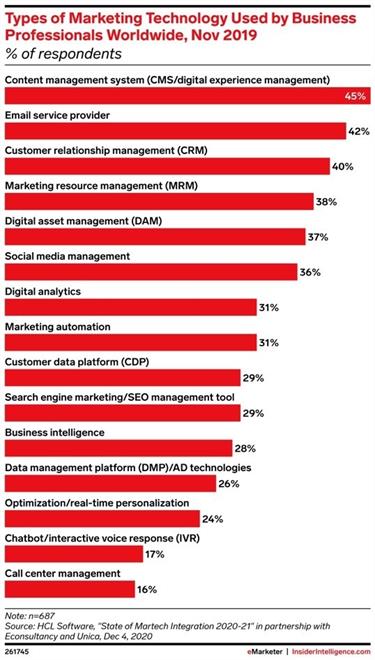Empowering Customer Self-Service with a Future-Looking CMS

Businesses are increasingly driving their hottest prospects to chatbots instead of humans. But does this shift in strategy makes sense or is it just a cost-cutting measure? Surprisingly, it may be both.
Technology Investment is Favoring Self-Service
 A recent eMarketer/Insider Intelligence survey asked more than 1,400 business professionals to rank 15 marketing technologies. These were marketers, information technology people and others who were interested in marketing technology. Respondents were asked, “Which of this list is the one that you are going to use most moving forward?” and they reported that content management ranked highest at about 45%.
A recent eMarketer/Insider Intelligence survey asked more than 1,400 business professionals to rank 15 marketing technologies. These were marketers, information technology people and others who were interested in marketing technology. Respondents were asked, “Which of this list is the one that you are going to use most moving forward?” and they reported that content management ranked highest at about 45%.
CMS Popularity is Not Surprising
It’s not surprising that content management, the backbone of digital experience, ranked highest. It’s also not surprising the usual suspects (email, CRM, DAM, marketing automation) filed in behind in large percentages.
What is interesting about this report is what appears towards the very bottom. Investment in chatbots ranked higher than call center management. These professionals determined that the technology that drives you to a human being should get less attention than the technology that drives you to seek help from a robot!
Of course, this is one survey and there are plenty of reasons to shift technology investment, but it supports a trend I think we can all innately sense: the shift toward self-service. In particular, the adoption of self-service available on-demand and supported by technology bringing the knowledge we need to our personal screens in real time.
See how Sitefinity CMS can help
When You Want Help, Where Do You Look First?
Something has changed regarding of the sources we seek for information. It started a couple decades ago, but it has accelerated dramatically in recent years. Somehow, we’ve become comfortable accepting help from non-human advisers. Maybe it’s the accessibility of personal screens as a first touchpoint for information. Maybe it’s efficiency. Or laziness.
Physical Storage is Shrinking
Libraries require less shelf space than they used to, but when was the last time you purchased a hardcopy of a repair manual? You may have noticed your local auto repair shop has extra bookshelf space as well. Who needs a stack of greasy, dog-eared, Haynes and Chilton manuals on the shelf, when their online subscription options are so reasonably priced?
And to that end, we seem to be getting comfortable paying for expert advice even when free options are available.
Health Clubs or Home Health?
A dramatic example is what we saw with the popularity of brands like Peloton and Mirror this past year. It has become clear that fitness enthusiasts will pay a premium for a motivating workout experience that’s provided on-demand, 24/7. In a 2Q21 shareholder letter, Peloton reported an incredible 12-month retention rate of 92% for subscribers (as a point of reference, Disney+ recently reported a 74% retention rate).
Not Surprising When You Think About It
So, with all this, the acceptance of chatbots and the proliferation of chat options shouldn’t be a surprise. The introduction of AI into the process has enhanced or replaced much of the old decision tree logic that produced solutions that were little more than texting answering machines. Modern systems produce responses to first-line support questions that are fast and accurate. The questions themselves can often be used to direct the inquiry to the correct human support resource when needed.
Privacy Concerns Are Not Actually Concerning
The expectation of privacy feels more realistic when we feel we control the conversation. And, in fact, chatbots (like Progress NativeChat) provide security compliance options and can easily be configured to enforce privacy priorities.
Chatbots Do Not Earn Commission
In addition to the accessibility and speed, there is another advantage chatbots provide in these first-touch conversations: they can be pretty good salespeople. A well-designed chatbot will ask essential open-ended questions to drill down to the customer’s need. By answering these questions, customers will be led to the solution options they had not yet considered. In this way, chatbots programmatically perform a function good salespeople preform instinctually—they uncover the problem (or pain point) the customer is seeking to eliminate.
We are a long way from replacing the well-honed skills of a seasoned sales professional with an algorithm, but in the meantime, the low-pressure consultative experience provided by a great chat solution isn’t such a bad place to start.
But the CMS is Still Key
As we march resolutely into a world with a mix of human and machine-driven interactions, your choice of the right CMS only becomes more essential. Progress Sitefinity is a flexible, configurable, extensible and easy-to-use digital experience platform both at the DevOps and marketer levels. It is the backbone of the digital experience your customers expect you to provide no matter what unexpected changes the years ahead will present.

J.D. Little
J.D. Little is a Senior CMS Market Strategist, a creative communicator, an educator and an advocate for change. Beginning his career in traditional media technology, he has been helping business leaders navigate the waves of disruptive innovation for more than 25 years.
Next:
Comments
Topics
- Application Development
- Mobility
- Digital Experience
- Company and Community
- Data Platform
- Security and Compliance
- Infrastructure Management
Sitefinity Training and Certification Now Available.
Let our experts teach you how to use Sitefinity's best-in-class features to deliver compelling digital experiences.
Learn MoreMore From Progress
Latest Stories
in Your Inbox
Subscribe to get all the news, info and tutorials you need to build better business apps and sites
Progress collects the Personal Information set out in our Privacy Policy and the Supplemental Privacy notice for residents of California and other US States and uses it for the purposes stated in that policy.
You can also ask us not to share your Personal Information to third parties here: Do Not Sell or Share My Info
We see that you have already chosen to receive marketing materials from us. If you wish to change this at any time you may do so by clicking here.
Thank you for your continued interest in Progress. Based on either your previous activity on our websites or our ongoing relationship, we will keep you updated on our products, solutions, services, company news and events. If you decide that you want to be removed from our mailing lists at any time, you can change your contact preferences by clicking here.

